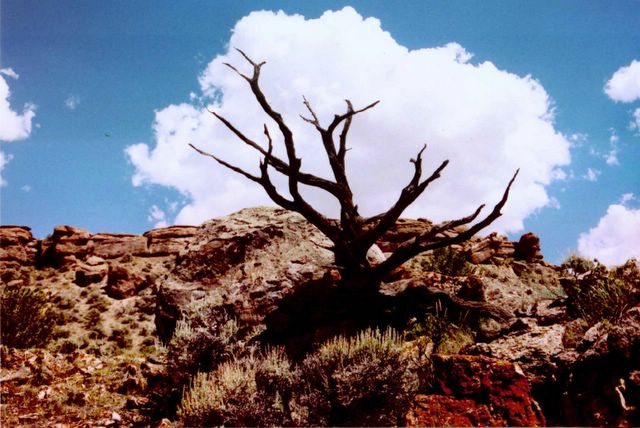
Thursday, October 26, 2006
Wednesday, October 25, 2006
Monday, October 23, 2006
Little Cups
Two churches I have now pastored, and two churches who have significant numbers of people who are majorly skiddish about using a common cup to celebrate communion. This past month at charge conference our DS led communion. Because I wasn't sure what kind of turnout we would have, I simply elected to use my chalice to serve communion. We ended up having about 30 people--and that was great. As I served people the cup into which they would dip their bread, I noticed faces of apprehension and even disgust. Oh, how entrenched are we in our customs, especially around communion. It seems that the cultures I have served are perhaps concerned about the cleanliness of taking communion by intinction. Instead we use little cups.
What do little cups say about us as a culture of Christians? First of all, This Holy Mystery proclaims little cups to be the bane of eucharistic theology. Their use destroys the symbolism of the liturgy. "After the supper was over, Christ took the cup--no Christ took little plastic cups and gave one to each of his disciples, saying "Drink ye from each of thy little cups, throw them in the trash on the way out the door, and do this as often as you drink it--or once a month, whatever." I suppose it seems that I'm being a bit persnickity, but to me it is more powerful to offer a single cup. "One cup of blessing which we bless," the list goes on and on of all the references, hymns, prayers, etc. that aren't given visual representation becasue we want our own little cup.
Is the little cup indicitive of our radical individualism? When did they come into use, and why? Are they commonly used in other parts of the world?
"Are you willing to drink of my cup and share in my baptism?" says Jesus. "No thanks, I'll have my own little cup thank you," says the church.
What do little cups say about us as a culture of Christians? First of all, This Holy Mystery proclaims little cups to be the bane of eucharistic theology. Their use destroys the symbolism of the liturgy. "After the supper was over, Christ took the cup--no Christ took little plastic cups and gave one to each of his disciples, saying "Drink ye from each of thy little cups, throw them in the trash on the way out the door, and do this as often as you drink it--or once a month, whatever." I suppose it seems that I'm being a bit persnickity, but to me it is more powerful to offer a single cup. "One cup of blessing which we bless," the list goes on and on of all the references, hymns, prayers, etc. that aren't given visual representation becasue we want our own little cup.
Is the little cup indicitive of our radical individualism? When did they come into use, and why? Are they commonly used in other parts of the world?
"Are you willing to drink of my cup and share in my baptism?" says Jesus. "No thanks, I'll have my own little cup thank you," says the church.
Wednesday, October 11, 2006
Monday, October 09, 2006
Good program coming up
Moyers on America : “Is God Green?”
PBS Airdate: Wednesday, October 11 at 9 p.m. (check local listings). 60 minutes.
A new holy war is growing within the evangelical community, with stakes for the earth and American politics. For over a decade liberal Christians have made the environment a moral commitment. Now some conservative evangelicals as well are standing up for the earth as a Biblical imperative of stewardship. From a dynamic conservative church in Boise , Idaho to an evangelical activist group known as Christians for the Mountains in West Virginia , grassroots believers are speaking out. So are some conservative evangelical leaders at the national level who have called for action to stop global warming. But they are being met head-on with opposition from religious right political figures like Jerry Falwell and James Dobson, who are pillars of the right-wing coalition that adamantly supports the Bush administration in downplaying the threat of global warming. The political stakes are high: three out of every four self-identified white evangelical voters cast their ballots for George W. Bush in 2004. The program explores how a serious split among conservative evangelicals over the environment and global warming could reshape American politics.
PBS Airdate: Wednesday, October 11 at 9 p.m. (check local listings). 60 minutes.
A new holy war is growing within the evangelical community, with stakes for the earth and American politics. For over a decade liberal Christians have made the environment a moral commitment. Now some conservative evangelicals as well are standing up for the earth as a Biblical imperative of stewardship. From a dynamic conservative church in Boise , Idaho to an evangelical activist group known as Christians for the Mountains in West Virginia , grassroots believers are speaking out. So are some conservative evangelical leaders at the national level who have called for action to stop global warming. But they are being met head-on with opposition from religious right political figures like Jerry Falwell and James Dobson, who are pillars of the right-wing coalition that adamantly supports the Bush administration in downplaying the threat of global warming. The political stakes are high: three out of every four self-identified white evangelical voters cast their ballots for George W. Bush in 2004. The program explores how a serious split among conservative evangelicals over the environment and global warming could reshape American politics.
Read the small print
I switched to Blogger Beta becasue "it was a lot easier, blah blah blah." The problem is that it took all the html code I had with it. Now I have to relearn. No time.
Wednesday, October 04, 2006
Subscribe to:
Comments (Atom)













